

Non-human persons.
Crows (and other Corvids) Monkeys. Cephalepods. Dogs. Pigs. Elephants. Morality and Social Behavior. Emergent Hive Minds. Dichotomistic logic - do spiders have a mind. Looking like a crusty flake of bark on the branch, Portia labiata, a thumbnail-sized jumping spider, stops to have a think.
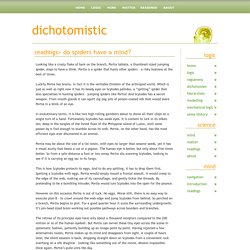
Portia is a spider that hunts other spiders – a risky business at the best of times. Non-Human Consciousness Exists Say Experts. Now What? Non-Human Consciousness Exists Say Experts.

Now What? Phillip Low at Singularity University Have you ever considered the consciousness, or unconsciousness, of your dog? Well, a group of neuroscientists have been thinking on the subject pretty seriously, and it was announced last week that "humans are not the only conscious beings in the universe". Alex (parrot) Alex (1976 – September 6, 2007)[1] was an African grey parrot and the subject of a thirty-year (1977–2007) experiment by animal psychologist Irene Pepperberg, initially at the University of Arizona and later at Harvard University and Brandeis University.
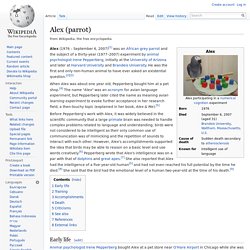
He was the first and only non-human animal to have ever asked an existential question.[2][3] When Alex was about one year old, Pepperberg bought him at a pet shop.[4] The name "Alex" was an acronym for avian language experiment, but Pepperberg later cited the name as meaning avian learning experiment to evoke further acceptance in her research field, a then-touchy topic (explained in her book, Alex & Me).[5] Animal psychologist Irene Pepperberg bought Alex at a pet store near O'Hare Airport in Chicago while she was doing research at Purdue University.
People Are Animals, Too. Reading this, I wonder what the correlation looks like for people who do or don't believe in human exceptionalism and those who do or don't subscribe to religion.
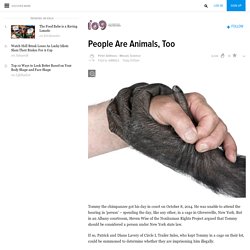
Do those who subscribe to Judeo-Christian beliefs (vs athiests or agnostics) tend to value animal life less because humans are created in the image of God and have souls while nonhuman animals aren't or don't? Also, a thought experiment... taking nonhuman animals out of the equation—if they didn't exist, for example—would you (any of you) consider it acceptable to experiment on human beings for the advancement of science and medicine? We do this to an extent voluntarily through clinical trials and what not, but I'm wondering if it would be acceptable to do to human beings what we currently do to animals in order, the more involuntary experimentation, if it advanced science and medicine.
Humans seem to have a general disregard for life on Earth, be it animal, plant or other... Scientists Learn A Bird Uses Tools, And Promptly Decide To Screw With It. 8 Glitches in Animal Behavior That Can End in Catastrophe. 3 Animals That Are Smarter Than You Thought. 5 Animals Who Taught Themselves Eerily Human Skills. Bee-eaters (Merops orientalis) respond to what a predator can see. Facebook. Are Shrinking Brains Making Us Smarter? - The human brain has decreased by about the size of a tennis ball over the past 30,000 years. - Evolution may be making our brains leaner and more efficient. - The same phenomenon can be observed in domestic animals compared to their wild counterparts.

Human brains have shrunk over the past 30,000 years, puzzling scientists who argue it is not a sign we are growing dumber but that evolution is making the key motor leaner and more efficient. The average size of modern humans -- Homo sapiens -- has decreased about 10 percent during that period -- from 1,500 to 1,359 cubic centimeters (91 to 83 cubic inches), the size of a tennis ball. Women's brains, which are smaller on average than those of men, have experienced an equivalent drop in size. These measurements were taken using skulls found in Europe, the Middle East and Asia. "I'd called that a major downsizing in an evolutionary eye blink," John Hawks of the University of Michigan told Discover magazine. The 5 Smartest Non-Primates on the Planet. Katharine Gammon, Life's Little Mysteries Contributor | July 29, 2011 05:56pm ET Credit: Walter Siegmund We humans tend to think we're pretty smart.
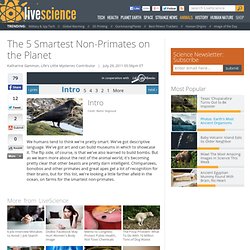
We've got descriptive language. Unusual Animal Intelligence. Before 1960 most of the work surrounding animal intelligence was centered around behavior, with famous experiments such as Pavlov’s dogs and Thorndike’s operant conditioning.

After 1960, the field began to shift to understand animal cognition and there has been much debate whether animals have an actual consciousness. The full extent of what animals think may never be known, but we already have seen amazing intelligence from some unlikely sources. Can Animals Think? The first time Fu Manchu broke out, zookeepers chalked it up to human error.
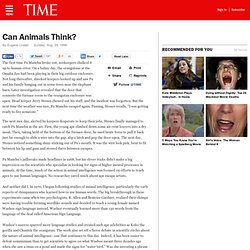
On a balmy day, the orangutans at the Omaha Zoo had been playing in their big outdoor enclosure. Not long thereafter, shocked keepers looked up and saw Fu and his family hanging out in some trees near the elephant barn. Later investigation revealed that the door that connects the furnace room to the orangutan enclosure was open. Head keeper Jerry Stones chewed out his staff, and the incident was forgotten.
But the next time the weather was nice, Fu Manchu escaped again. The next nice day, alerted by keepers desperate to keep their jobs, Stones finally managed to catch Fu Manchu in the act.